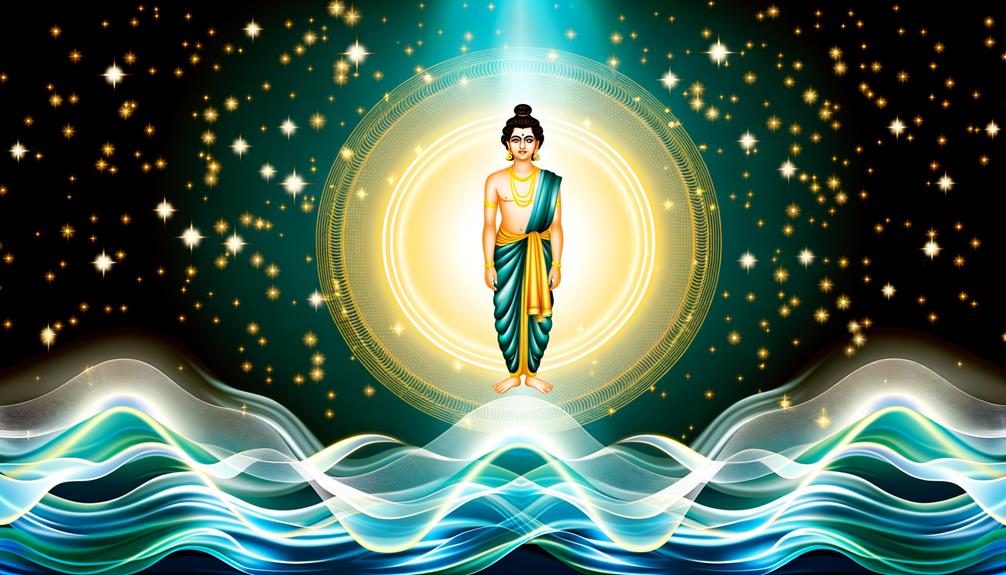Varun Name Meaning in English
The name Varun, traced to ancient Indian mythology and Sanskrit, signifies the deity Varuna, the god of water and cosmic order. Varuna holds dominion over oceans, rivers, and the celestial sky.
This name evokes attributes of purity, strength, and cosmic vastness, reflecting deep connections with nature and moral authority. With its resurgence in modern times, Varun symbolizes a blend of historical reverence and contemporary significance.
Recognized for embodying leadership and innovation, the name continues to gain popularity. For insights into traits associated with Varun and its cultural evolution, examine further.

Key Takeaways
- Varun means "god of water" and "cosmic order" in Sanskrit.
- It originates from the ancient Indian deity Varuna.
- The name symbolizes purity, strength, and the vastness of the cosmos.
- It is associated with environmental harmony and moral authority.
- Varun reflects cultural continuity and spiritual reverence.
Origin of Varun
The name Varun has its origins in ancient Indian mythology and Sanskrit language, where it is associated with the deity Varuna, the god of water and celestial oceans.
In Sanskrit, 'Varuna' signifies the enveloping sky and the vast expanse of water, reflecting a profound connection to natural elements.
Historically, Varuna was revered as a principal deity in the Rigveda, one of the oldest sacred texts in Hinduism. This significant role underscores the name's deep-rooted historical and linguistic importance.
The evolution of the name Varun, from a divine entity to a common given name, exemplifies the enduring influence of ancient cultural and religious narratives on contemporary naming practices. Its origin is a proof to the enduring legacy of ancient Indian tradition.
Cultural Significance
Varun holds substantial cultural significance in Indian society, symbolizing elements of nature and divine authority. The name Varun is often associated with water, sky, and the natural laws governing the universe. Its prominence extends beyond mere nomenclature, reflecting deep-rooted cultural beliefs and values.
- Environmental Harmony: Varun embodies the balance of natural elements.
- Spiritual Reverence: The name is often invoked in religious rituals and prayers.
- Cultural Continuity: It is a common name across generations, preserving tradition.
- Moral Authority: Varun signifies justice and ethical governance in various texts.
- Artistic Inspiration: The name inspires literature, music, and visual arts, reflecting its profound impact.
This cultural resonance secures Varun's sustained relevance in Indian life.
Mythological Connections
Beyond its cultural significance, the name Varun is deeply rooted in ancient mythology. It is attributed to the Vedic deity Varuna, the god of water and cosmic order. Varuna is revered in early Vedic texts as a paramount deity who governs the moral and natural laws of the universe, known as 'Rta.' His dominion extends over the oceans, rivers, and the celestial domains, signifying his extensive control over both terrestrial and cosmic waters.
In Vedic hymns, Varuna is often invoked for his ability to maintain harmony and truth, reflecting his integral role in the pantheon. This mythological connection imbues the name Varun with profound spiritual and historical resonance, linking it to ancient beliefs and sacred traditions.
Symbolism and Attributes
Rooted in its mythological origins, the name Varun symbolizes purity, strength, and the vastness of the cosmos. This name is deeply intertwined with the ancient deity Varuna, the god of water and the celestial oceans in Hindu mythology. The attributes associated with Varun reflect a profound connection to natural elements and moral virtues.
To elucidate its symbolism, consider the following core attributes:
- Purity: Signifying untainted and pristine qualities.
- Strength: Embodying resilience and fortitude.
- Vastness: Representing the infinite and expansive nature of the universe.
- Order: Denoting a sense of cosmic balance and justice.
- Wisdom: Reflecting deep knowledge and insight.
These attributes collectively paint a picture of a name that is as profound as it is timeless.
Varun in Modern Times
In contemporary society, the name Varun has seen a resurgence in popularity, reflecting its enduring cultural significance.
While retaining its traditional attributes, modern interpretations of Varun often emphasize qualities such as leadership and innovation.
This blend of historical reverence and contemporary relevance underscores Varun's continued importance in various cultural contexts.
Varun's Popularity Today
Varun's popularity in contemporary times is illustrated by its frequent appearance in baby name charts and its association with prominent figures in various fields. This name's enduring appeal is reflected in its widespread use across diverse cultures and professions.
Several factors contribute to its current prominence:
- Celebrity Influence: Actors like Varun Dhawan have brought the name to the forefront.
- Global Adaptability: Its easy pronunciation and universal appeal make it popular worldwide.
- Historical Resonance: The name's connection to ancient Vedic traditions adds depth.
- Modern Relevance: Increasing use in technology and business sectors.
- Social Media Presence: Enhanced visibility through digital platforms.
These elements collectively underscore Varun's sustained popularity and relevance in modern times.
Cultural Significance Maintained
The name Varun continues to hold cultural significance in modern times, reflecting a blend of ancient heritage and contemporary relevance. Rooted in Hindu mythology, Varun is traditionally associated with the god of water and the sky, symbolizing power and authority.
Today, the name transcends its mythological origins, finding resonance in various professional and social spheres. Its enduring appeal is evident in its continued usage across generations, signifying a respect for cultural roots while embracing modernity.
The name Varun often carries connotations of strength and reliability, attributes highly valued in contemporary society. The name maintains a strong cultural presence, embodying a harmonious balance between historical tradition and present-day significance.
Modern Interpretations of Varun
Modern interpretations of the name Varun highlight its adaptability and relevance in diverse contexts, from professional achievements to personal identities. Varun is increasingly recognized for its modern resonance while maintaining its traditional roots. In contemporary settings, individuals named Varun often embody qualities that resonate with both ancient significance and current aspirations.
Key modern interpretations include:
- Leadership: Many Varuns excel in leadership roles, reflecting the name's historical connotation of authority.
- Innovation: The name is often associated with creativity and forward-thinking.
- Cultural Bridge: Varun serves as a cultural link between Eastern heritage and Western modernity.
- Resilience: Individuals named Varun frequently display adaptability and strength.
- Popularity: The name continues to be a popular choice, reflecting its timeless appeal.
These aspects underscore its enduring and evolving significance.
Popularity and Usage
The popularity and usage of the name Varun have evolved substantially over time, reflecting both historical trends and regional variations.
While the name enjoys enduring prominence in regions with strong cultural ties to its origins, modern usage patterns indicate a growing global presence.
An analysis of these factors provides a detailed understanding of Varun's contemporary appeal and its importance in various cultural contexts.
Historical Name Trends
Throughout history, the name Varun has experienced varying degrees of popularity and cultural significance, reflecting broader societal trends and shifts in naming conventions. Initially rooted in ancient Hindu mythology, where Varun is the god of water and the celestial ocean, the name's usage has evolved over centuries.
Key historical trends include:
- Ancient Period: High usage among royal and noble families, symbolizing divine connection.
- Medieval Era: Decline in popularity due to sociopolitical changes and regional conflicts.
- Colonial Period: Further decline as Western names became prevalent.
- Post-Independence: Revival associated with cultural renaissance and national identity.
- Modern Times: Steady rise in popularity, reflecting renewed interest in traditional names.
These trends illustrate the dynamic interplay between cultural heritage and contemporary naming practices.
Regional Popularity Insights
Regional popularity of the name Varun varies greatly, influenced by cultural, linguistic, and sociopolitical factors unique to each area. In India, the name Varun is prominently popular, reflecting its deep roots in Hindu mythology and Sanskrit origins. In contrast, the name's popularity in Western countries is relatively modest, often linked to the diaspora communities. The table below illustrates the varying popularity of Varun across different regions:
| Region | Popularity Level | Cultural Significance |
|---|---|---|
| India | High | Mythological and linguistic significance |
| United States | Moderate | Popular among Indian diaspora |
| United Kingdom | Moderate | Steady use within South Asian communities |
| Canada | Moderate | Reflects multicultural demographic trends |
| Australia | Low | Limited to specific ethnic communities |
This table underscores the diverse factors behind the name's regional usage.
Modern Usage Patterns
How has the name Varun adapted to contemporary trends in naming conventions across different cultural landscapes?
The name Varun, rooted in ancient Hindu mythology, has smoothly evolved into modern usage, reflecting a blend of tradition and current appeal. Its popularity spans beyond Indian borders, indicating a broader acceptance and flexibility.
- Globalization: Increased intercultural exchanges have led to the name's adoption in non-traditional regions.
- Media Influence: Popularity of Indian cinema and celebrities named Varun has elevated its recognition.
- Cultural Integration: Immigrant communities preserve cultural heritage through names like Varun, ensuring continuity.
- Phonetic Appeal: The name's simplicity and ease of pronunciation make it appealing across diverse linguistic backgrounds.
- Modern Naming Trends: Favorability towards unique, yet meaningful names boosts Varun's contemporary usage.
Personal Traits
Known for their adaptability and keen intellect, individuals named Varun often exhibit a unique blend of curiosity and resilience in their personal traits.
These individuals are typically quick learners, displaying an innate ability to absorb and process information efficiently. Their inquisitive nature drives them to explore diverse interests and fields, making them versatile and well-rounded.
Resilience is another hallmark, enabling them to navigate challenges with a balanced and composed demeanor. Often seen as reliable and resourceful, Varuns tend to excel in problem-solving scenarios, leveraging their analytical skills to find effective solutions.
Their ability to remain calm under pressure further enhances their capacity to lead and inspire others, positioning them as valuable assets in both personal and professional spheres.
Conclusion
To sum up, the name Varun, steeped in cultural and mythological significance, embodies rich symbolism and attributes. Like a multifaceted gem, it reflects diverse historical, spiritual, and modern dimensions.
Its enduring popularity underscores its resonance across generations, while the personal traits associated with it highlight a blend of strength and wisdom.
The name's profound roots and contemporary relevance make it a compelling choice, bridging ancient traditions with present-day appeal.






